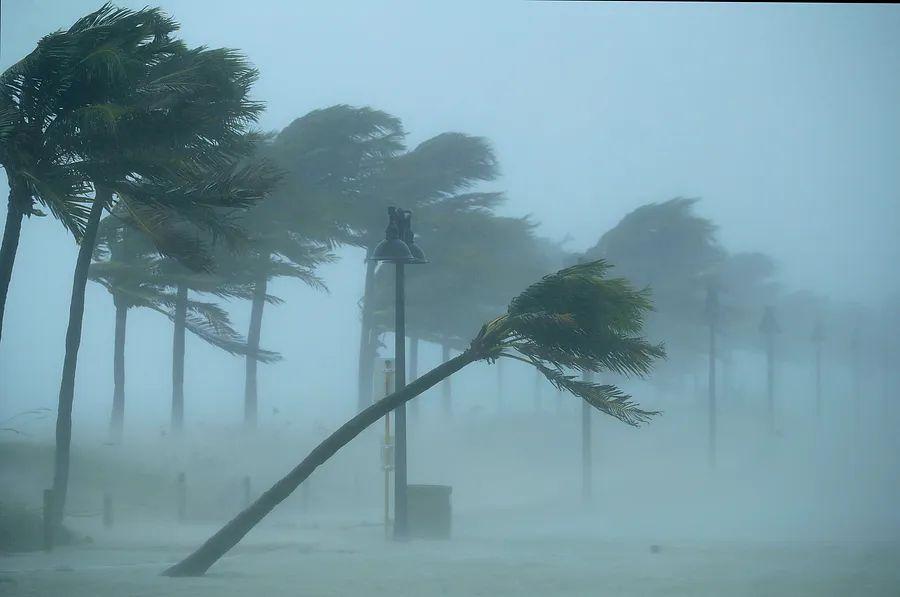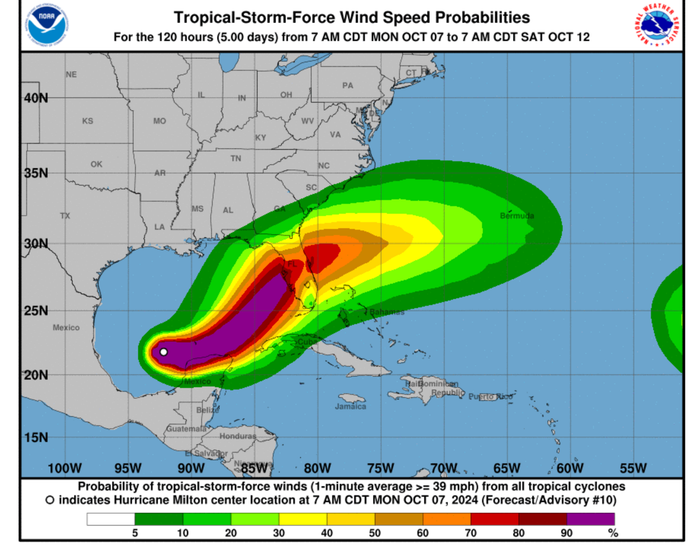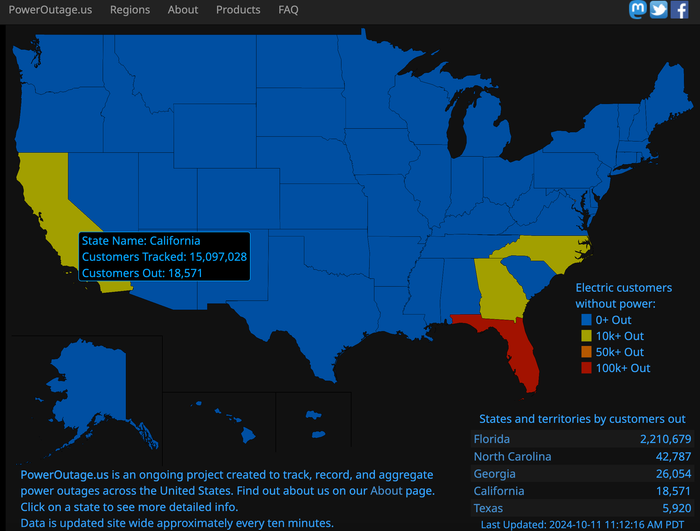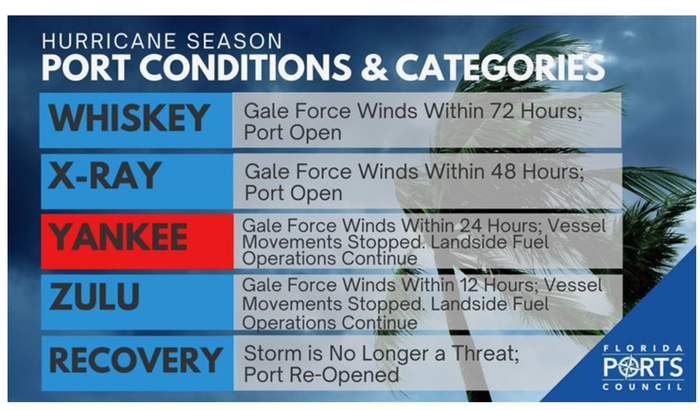Travel Tips for Hurricane Milton: Essential Information for Florida Visitors

Hurricane Milton struck Florida on Wednesday, hitting the west coast before advancing east toward the Atlantic Ocean.
Milton made landfall as a Category 3 hurricane (with Category 5 being the most severe) just south of Tampa Bay Wednesday evening, resulting in an astonishing 116 tornado warnings. The damage extended all the way to Palm Beach County on the east coast. The powerful winds tore the roof off Tropicana Field in St. Petersburg, and the effects of the storm were still felt statewide on Thursday.
Meteorologists forecasted a storm surge between 8 to 12 feet and rainfall totals ranging from 5 to 18 inches in some regions. Certain parts of Florida remain under mandatory evacuation orders.
Receive expert tips on achieving your ideal travel destination by subscribing to the daily newsletter.
If you have a trip to Florida coming up, it's crucial to stay updated on the conditions at your intended destination. The extent of the damage from Hurricane Milton will vary based on your travel plans. If you're heading to the western coast this week, you may need to reconsider your itinerary.
Here’s the latest on travel to Florida at this moment.
 NATIONAL OCEANIC AND ATMOSPHERIC ADMINISTRATION
NATIONAL OCEANIC AND ATMOSPHERIC ADMINISTRATIONIs traveling to Florida safe right now?
You should approach your travel plans with caution — or consider changing them — if you're scheduled to visit Central Florida, the western coast, or Palm Beach County this week.
The coastal regions of Tampa and Sarasota, along with nearby areas, are still grappling with the aftermath of Hurricane Helene, which struck just two weeks ago. These locations have been urging travelers to refrain from visiting.
"Lido Beach is currently CLOSED," stated the Sarasota government website as of October 1. "Visitors and 'disaster tourists' are hindering our recovery efforts. There are no restroom facilities, food services, lifeguards, or other amenities available. Hazards, both visible and hidden, may exist on the beach. Please stay away to allow our City staff to focus on recovery in the area."
The official tourism site for the state, Visit Florida, has released updated information as officials assess the damage and work to reopen roads and airports.
Poweroutage.us reports that over 2.2 million residents in Florida are currently experiencing power outages as of Friday afternoon.
 A map illustrating the power outages. POWEROUTAGE.COM
A map illustrating the power outages. POWEROUTAGE.COMUpdates on theme parks
Milton journeyed through a vast part of the state, including Tampa and Orlando, home to many of Florida's most beloved theme parks.
Walt Disney World temporarily shut down its four theme parks, two water parks, and Disney Springs on Wednesday afternoon, keeping them closed through Thursday. As of Friday, the parks have reopened and are functioning normally, with Disney's Typhoon Lagoon water park set to reopen on Saturday.
Some facilities, such as Disney's Fort Wilderness Resort and the Treehouse Villas at Disney's Saratoga Springs Resort & Spa, are also temporarily closed with no specific date for reopening. All other accommodations are currently operational.
Universal Studios Orlando, Universal Islands of Adventure, Universal Orlando CityWalk, and Universal Volcano Bay all closed on Wednesday afternoon and remained closed on Thursday. The Halloween Horror Nights events at Universal Studios Orlando were also canceled for Thursday. Normal operations, including Halloween Horror Nights, resumed on Friday.
Legoland Florida and SeaWorld Orlando were closed until Thursday but have since reopened. Busch Gardens Tampa Bay, however, remains closed with no announcement on a reopening date.
Most parks have a severe weather policy in place for guests impacted by the hurricane. For more information, please contact customer service or check the park's website.
Closures of airlines and airports in Florida
Tampa International Airport (TPA) suspended operations on Tuesday morning but is now back open.
St. Pete-Clearwater International Airport (PIE), which serves Allegiant Air, closed on Tuesday afternoon after the final flight had left. Allegiant has canceled all flights at PIE until at least Friday, and the airport has not yet announced a reopening date.
Orlando International Airport (MCO) suspended both commercial and private flights on Wednesday morning, while still allowing emergency aid flights to operate. The airport reopened on Friday.
Southwest Florida International Airport (RSW) in Fort Myers resumed operations at 9 a.m. on Friday.
Palm Beach International Airport (PBI) closed on Wednesday evening but reopened on Friday, cautioning travelers: "There are still some cancellations, so please verify with your airline before heading to the airport."
Airlines operating in Florida provided a range of travel waivers due to the storm. The specifics of each waiver varied, but they typically applied to flights to, from, or through different airports in Florida between Tuesday and Thursday. With these waivers, travelers can change their flights without incurring fare differences, although new travel dates generally need to be by October 17.
If you have upcoming travel this week, check with your airline for more information.
When will Florida's airports be reopening?
Most airports that temporarily closed in preparation for Hurricane Milton are now open and functioning normally.
As of Friday, Tampa International Airport (TPA), Orlando International Airport (MCO), Orlando Sanford International Airport (SFB), Southwest Florida International Airport (RSW), and Palm Beach International Airport (PBI) have all resumed full commercial operations. However, these airports recommend that travelers check directly with their airlines for updates on delays and cancellations, as some flights might still be impacted.
St. Pete-Clearwater International Airport (PIE) and Daytona Beach International Airport (DAB) are currently evaluating damage and have not yet provided reopening timelines.
Sarasota Bradenton International Airport (SRQ) is scheduled to reopen on Saturday morning.
What should you do if you have a hotel or Airbnb reservation in Florida?
It's advisable to proactively modify your reservation now. If you booked directly with a hotel, first check their website for any updates. You can also call the hotel or the main reservations line. Remember that many properties might be focused on crisis management, so contacting the property directly should be a last resort.
If you made your booking through a third-party online travel agency like Expedia or Travelocity, it's essential to review their cancellation policy. The OTA retains ownership of your reservation until your travel date; if you reach out to the hotel, they will likely direct you back to the OTA for assistance.
For hotels affected in areas listed on Expedia and Hotels.com, these companies are currently waiving cancellation policies. You can receive a full refund for bookings in Milton's impact zone. Customer care teams are available 24/7 to assist with rebooking and cancellations for Expedia and Hotels.com.
Vrbo has implemented its extenuating circumstances policy, allowing travelers to receive a full refund for trips that haven't started and partial refunds for those already in progress in the impacted areas. Vrbo will also refund the full traveler service fee for affected bookings.
Airbnb.org is providing temporary housing for individuals impacted by hurricanes Helene and Milton.
What should you do if you have a cruise departing from Florida?
 Passengers are seen waiting to board the Royal Caribbean's Liberty of the Seas at Port Everglades. CARLINE JEAN/SOUTH FLORIDA SUN SENTINEL/TRIBUNE NEWS SERVICE/GETTY IMAGES
Passengers are seen waiting to board the Royal Caribbean's Liberty of the Seas at Port Everglades. CARLINE JEAN/SOUTH FLORIDA SUN SENTINEL/TRIBUNE NEWS SERVICE/GETTY IMAGESPort Tampa Bay sustained no damage, but many surrounding areas are still without power. The port has entered "recovery" status (indicating it has reopened but is still assessing conditions) and advises passengers with upcoming sailings to contact their cruise lines directly for the latest information.
Both JaxPort in Jacksonville and Port Canaveral (the port serving Orlando) have reopened for land-based operations. However, all shoreside ship activities are currently suspended, affecting cruise operations.
The Port of Palm Beach is operating normally, as are PortMiami and Port Everglades in Fort Lauderdale.
If you're planning to cruise from Florida soon, be ready for potential cancellations, route changes, and altered departure times. Here's where to find the latest updates regarding affected sailings from cruise lines, including a dozen from Carnival Cruise Line, seven from Royal Caribbean, and a few from Margaritaville at Sea:
- Carnival Cruise Line
- Royal Caribbean
- Disney Cruise Line
- Margaritaville at Sea
 FLORIDA PORTS COUNCIL
FLORIDA PORTS COUNCILIt's crucial to be familiar with the cancellation and rebooking policies of the specific cruise line you booked with; check directly with your line for specific details. Additionally, review your cruise contract to understand your entitlements in this situation. Consider what may be covered under your cruise travel insurance (if applicable), or see if you booked using a credit card that provides travel insurance.
For sailings canceled before departure, cruise lines typically offer either a full refund or future cruise credit, allowing you to rebook for a later date. In cases of itinerary changes, compensation is generally not provided, except for port taxes and fees for any missed ports that weren't replaced by others. Shore excursions in missed ports will be refunded if booked through the cruise line; for third-party tours, check with your excursion provider.
For cruises already in progress that have been extended due to the storm, cruise lines usually assist with rebooking flights home, although passengers may need to cover the cost. Occasionally, cruise lines may offer partial refunds or future cruise credits, but passengers are not guaranteed these under most contracts.
Refer to TPG's guide on what happens if a cruise gets canceled for further information if you receive notification that your cruise has been canceled.
Will your credit card or travel insurance cover changes?
If you purchased travel insurance before Hurricane Milton was named, you should be able to recover most of your travel expenses. However, if you obtained a policy after the storm was named, it will not provide any assistance.
"Insurance is designed to cover the unexpected," said Jenna Hummer, director of public relations for Squaremouth, a company that compares travel insurance options from leading U.S. providers. "Once an event is classified as 'foreseen'—in this instance, when a tropical storm or hurricane has been named—you can no longer obtain coverage for that storm."
 NATIONAL OCEANIC AND ATMOSPHERIC ADMINISTRATION
NATIONAL OCEANIC AND ATMOSPHERIC ADMINISTRATION"Trip cancellation and interruption policies will reimburse you for lost or unused prepaid, nonrefundable expenses if a hurricane makes it impossible to reach your destination," explained Stan Sandberg, co-founder of TravelInsurance.com. "Many plans also offer coverage in case of a mandatory evacuation at the destination. A few plans even cover instances where there is a NOAA hurricane warning at your destination during your travel dates."
Trip delay coverage will compensate you for unforeseen travel expenses such as food, transportation, internet access, and lodging if your flight is delayed for an extended period.
"Keep in mind that your credit card will only cover expenses made with that card," Hummer noted regarding trip insurance benefits associated with credit cards. "If you haven't charged your entire trip to that card, or if others in your party used different payment methods, you won't have full coverage."
TPG offers a comprehensive guide on credit cards that provide trip cancellation and interruption insurance. It also discusses potential coverage related to natural disasters.
How to assist
If you want to support those affected by the storm, there are several ways to contribute:
- World Central Kitchen
- American Red Cross
- All Hands and Hearts
- SPCA Tampa Bay
- The Humane Society of the United States
- Direct Relief
- Feeding Tampa Bay
- The Salvation Army
In summary
Hurricane Milton struck Florida on Wednesday night as a powerful Category 3 hurricane, causing widespread power outages and several fatalities throughout the state. This event occurred just two weeks after Hurricane Helene, which delivered record rainfall to the Tampa and Sarasota regions.
If you're planning to visit an area impacted by the hurricanes, it may be wise to postpone or cancel your trip until a later date.
For additional tips on managing travel during hurricane season, check out:
- Hurricane season is here: TPG's storm guide for travelers
- Cruising during hurricane season: Key insights — should you go?
- Is travel insurance necessary if your credit card offers protection?
- Is travel insurance a good investment?
- Flight canceled or delayed? Here's your next steps

1

2

3

4

5
Evaluation :
5/5